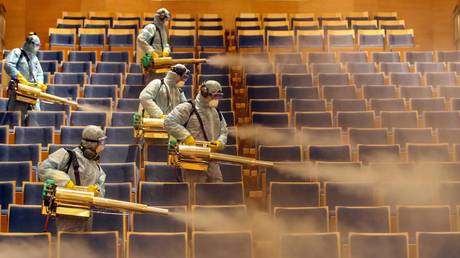Fyodor Lukyanov: The Impact of Covid-19 on the Global Order
Future historians will assess that the pandemic represented a pivotal moment in history.

Five years may seem insignificant in the grand scheme of history, yet January 2020 feels like a distant memory. The Covid-19 pandemic transformed not only our daily routines but also the global socio-political landscape, signifying the conclusion of one era and the initiation of another.
**The Last Days of Peace**
The 50th Anniversary Forum in Davos in January 2020 offered a glimpse of a world on the brink of change. At the height of her fame, Swedish teenager Greta Thunberg emerged as a leading figure representing left-leaning environmental activism. In sharp contrast, US President Donald Trump, the embodiment of anti-globalism, advocated for his “America First” agenda to an audience of wary attendees. European leaders held onto hope that a Democratic win in the upcoming election would soon overturn Trump’s presidency.
However, behind the curtains, conversations painted a different narrative. Key individuals from politics, business, and culture privately acknowledged that global processes were increasingly spiraling out of control, yet they still believed that collective action and ingenuity might correct the trajectory.
Amid these reflections, a new infection was spreading in China, casting a shadow over their discussions. Few at Davos comprehended the severity of the situation, with the majority perceiving the virus solely in relation to its possible effects on the global economy dependent upon China.
In hindsight, it marked the last “peaceful” Davos. The years that followed would see the agenda largely focused on the pandemic, followed by a series of escalating armed conflicts, from Eastern Europe to the Middle East.
**A World Shut Down**
The Covid-19 pandemic abruptly halted globalization in March 2020. Borders closed, economies came to a standstill, and global supply chains ground to a halt. For the first time in decades, the foundational freedoms tied to global integration — the movement of people, goods, services, and capital — faced significant disruptions. The only aspect that remained unfettered was the flow of information, which paradoxically magnified global panic.
The liberal world order, which had flourished on globalization, confronted its biggest challenge. For years, globalization was viewed as an inevitable process, seemingly beyond the control of individual states. Yet, within weeks, it became evident that this interconnected system was capable of being paused, contradicting the assumption that globalization was a one-way street.
Despite the upheaval, the world did not collapse. Nations adapted, economies recalibrated, and even the poorest countries discovered paths to endure. This resilience dismantled the narrative that liberal globalization represented the pinnacle of human achievement, revealing that this era, like its predecessors, had limits.
**Pandemic as a Catalyst**
The pandemic acted as a catalyst for existing tensions, exposing vulnerabilities within societies, governments, and international institutions. Countries experienced unprecedented strain, while governments used the crisis to test new governance and control methods. Policies that might have faced opposition under normal circumstances were legitimized under the guise of public health.
The crisis also facilitated strategic adjustments, as seen in Azerbaijan’s decisive victory in the Second Karabakh War and the renewed hostilities between India and China in Ladakh, all happening amidst the global turmoil of the pandemic.
Perhaps most crucially, the pandemic illustrated that the world could operate without the established global order. This insight weakened the idea of a singular, cohesive international system, setting the stage for a more fragmented, multipolar world.
**A New Balance of Power**
The pandemic laid bare the shortcomings and diminished credibility of international institutions. The initial “every nation for itself” mindset that prevailed during the early stages of the crisis further eroded trust in global norms and legitimized national self-interest as a guiding principle.
This shift towards prioritizing national security and self-reliance accelerated the dispersal of global influence. The pandemic showcased that smaller, more agile nations with effective governance could outpace traditional great powers. Consequently, the global balance of power became increasingly decentralized, with no single entity exerting predominant influence.
This new reality raises questions about the concept of a “multipolar world.” Rather than a handful of dominant poles, we now encounter an array of important players of varying strengths, interacting in complex and context-dependent ways.
**The Importance of Neighbors**
Another significant lesson from the pandemic was the rising significance of regionalism and proximity. Shorter supply chains demonstrated greater resilience, and neighboring countries became increasingly critical to each other's political and economic stability. This trend is evident in regions such as the Middle East, South Caucasus, and even North America.
As military and political tensions surge, neighboring states are playing a more prominent role than distant powers, reshaping the dynamics of influence.
**Liberal Globalization is Over**
In many respects, the Ukraine crisis that unfolded after the pandemic echoed the earlier disruptions. Just as the pandemic severed global connections out of necessity, geopolitical maneuvers in 2022 further fractured the international order. Yet, yet again, the world did not come apart at the seams.
Attempts to economically and politically isolate Russia have not succeeded in dismantling the global system; instead, the system adapted, becoming more varied and less rule-bound. The much-discussed 'rules-based order' of liberal globalization has transitioned into a more pragmatic, albeit chaotic, approach to international relations.
This new era is characterized by ad hoc agreements and situational alliances rather than a cohesive set of norms and rules. While this may decrease the predictability of international relations, it simultaneously opens avenues for greater flexibility and resilience.
**Looking Ahead**
The pandemic stripped away the façade of a stable, unified world, exposing the fractures beneath. While the immediate crisis has subsided, its legacy continues to influence global dynamics.
The world currently teeters on the brink of transition, characterized by uncertainty and competition. The liberal-globalist narrative that dominated the late 20th century has given way to a more fractured, multipolar reality.
This is not to suggest that the future is grim. The challenges faced in recent years have also highlighted the resilience of states and societies. The pressing question now is whether the world can navigate this new phase without spiraling into greater conflict.
While the pandemic acted as a catalyst for this transformation, it merely marked the beginning. The forthcoming chapter of international relations will hinge upon how states adjust to this new reality — and whether they can find common ground in an increasingly divided environment.
This article was originally published by the magazine Profile and translated and edited by the RTN team.
Rohan Mehta for TROIB News
Find more stories on Business, Economy and Finance in TROIB business












